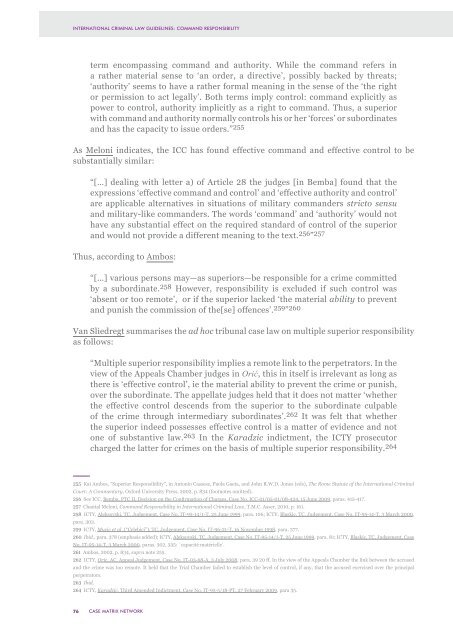Command Responsibility
CMN_ICL_Guidelines_Command_Responsibility_En
CMN_ICL_Guidelines_Command_Responsibility_En
You also want an ePaper? Increase the reach of your titles
YUMPU automatically turns print PDFs into web optimized ePapers that Google loves.
INTERNATIONAL CRIMINAL LAW GUIDELINES: COMMAND RESPONSIBILITY<br />
term encompassing command and authority. While the command refers in<br />
a rather material sense to ‘an order, a directive’, possibly backed by threats;<br />
‘authority’ seems to have a rather formal meaning in the sense of the ‘the right<br />
or permission to act legally’. Both terms imply control: command explicitly as<br />
power to control, authority implicitly as a right to command. Thus, a superior<br />
with command and authority normally controls his or her ‘forces’ or subordinates<br />
and has the capacity to issue orders.” 255<br />
As Meloni indicates, the ICC has found effective command and effective control to be<br />
substantially similar:<br />
“[…] dealing with letter a) of Article 28 the judges [in Bemba] found that the<br />
expressions ‘effective command and control’ and ‘effective authority and control’<br />
are applicable alternatives in situations of military commanders stricto sensu<br />
and military-like commanders. The words ‘command’ and ‘authority’ would not<br />
have any substantial effect on the required standard of control of the superior<br />
and would not provide a different meaning to the text. 256 ” 257<br />
Thus, according to Ambos:<br />
“[…] various persons may—as superiors—be responsible for a crime committed<br />
by a subordinate. 258 However, responsibility is excluded if such control was<br />
‘absent or too remote’, or if the superior lacked ‘the material ability to prevent<br />
and punish the commission of the[se] offences’. 259 ” 260<br />
Van Sliedregt summarises the ad hoc tribunal case law on multiple superior responsibility<br />
as follows:<br />
“Multiple superior responsibility implies a remote link to the perpetrators. In the<br />
view of the Appeals Chamber judges in Orić, this in itself is irrelevant as long as<br />
there is ‘effective control’, ie the material ability to prevent the crime or punish,<br />
over the subordinate. The appellate judges held that it does not matter ‘whether<br />
the effective control descends from the superior to the subordinate culpable<br />
of the crime through intermediary subordinates’. 262 It was felt that whether<br />
the superior indeed possesses effective control is a matter of evidence and not<br />
one of substantive law. 263 In the Karadzic indictment, the ICTY prosecutor<br />
charged the latter for crimes on the basis of multiple superior responsibility. 264<br />
255 Kai Ambos, “Superior <strong>Responsibility</strong>”, in Antonio Cassese, Paola Gaeta, and John R.W.D. Jones (eds), The Rome Statute of the International Criminal<br />
Court: A Commentary, Oxford University Press, 2002, p. 834 (footnotes omitted).<br />
256 See ICC, Bemba, PTC II, Decision on the Confirmation of Charges, Case No. ICC-01/05-01/08-424, 15 June 2009, paras. 415-417.<br />
257 Chantal Meloni, <strong>Command</strong> <strong>Responsibility</strong> in International Criminal Law, T.M.C. Asser, 2010, p. 161.<br />
258 ICTY, Aleksovski, TC, Judgement, Case No. IT-95-14/1-T, 25 June 1999, para. 106; ICTY, Blaskic, TC, Judgement, Case No. IT-95-14-T, 3 March 2000,<br />
para. 303.<br />
259 ICTY, Mucic et al. (“Celebici”), TC, Judgement, Case No. IT-96-21-T, 16 November 1998, para. 377.<br />
260 Ibid., para. 378 (emphasis added); ICTY, Aleksovski, TC, Judgement, Case No. IT-95-14/1-T, 25 June 1999, para. 81; ICTY, Blaskic, TC, Judgement, Case<br />
No. IT-95-14-T, 3 March 2000, paras. 302, 335: `capacité matérielle’.<br />
261 Ambos, 2002, p. 834, supra note 255.<br />
262 ICTY, Oric, AC, Appeal Judgement, Case No. IT-03-68-A, 3 July 2008, para. 39 20 ff. In the view of the Appeals Chamber the link between the accused<br />
and the crime was too remote. It held that the Trial Chamber failed to establish the level of control, if any, that the accused exercised over the principal<br />
perpetrators.<br />
263 Ibid.<br />
264 ICTY, Karadzic, Third Amended Indictment, Case No. IT-95-5/18-PT, 27 February 2009, para 35.<br />
76<br />
CASE MATRIX NETWORK


